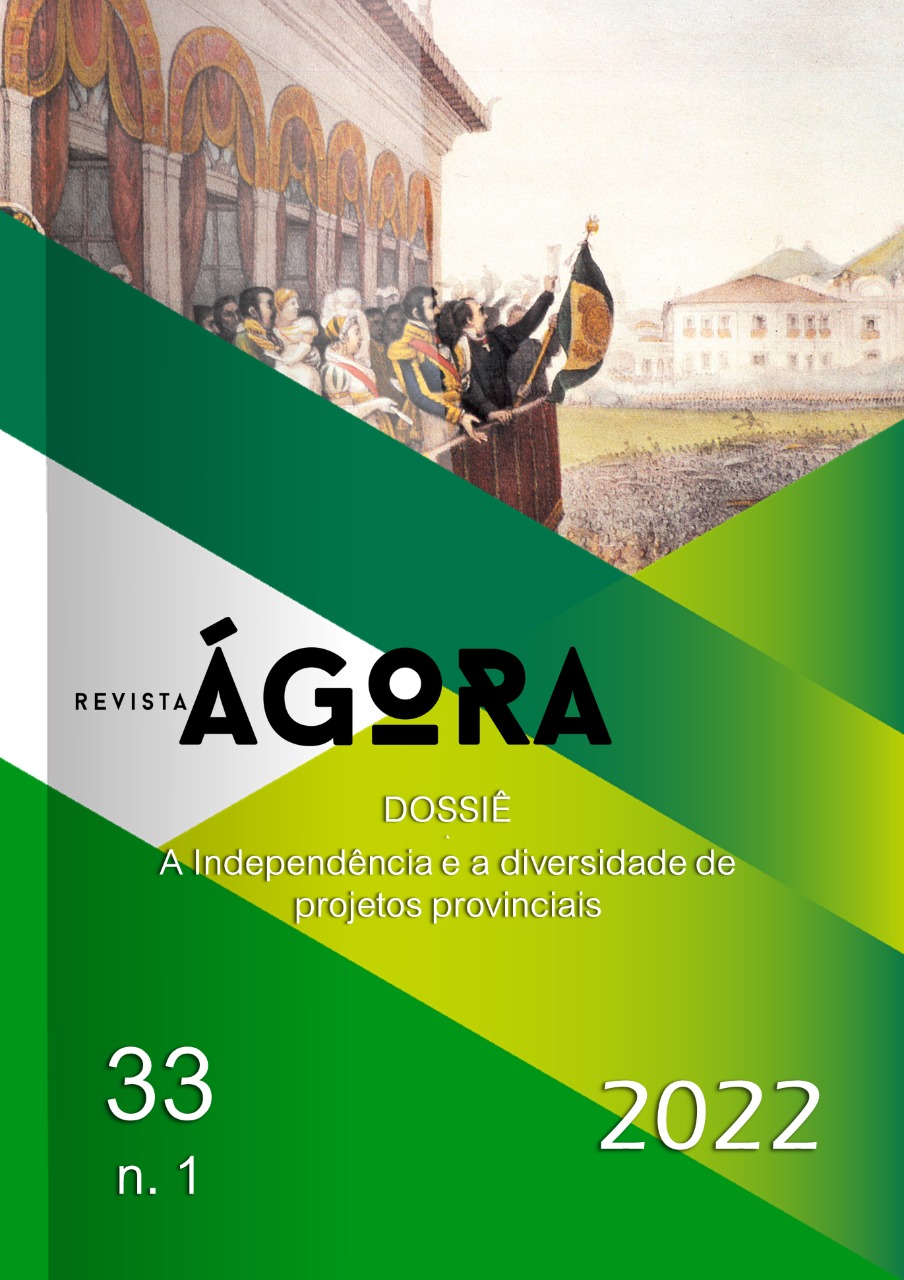Matrons in Roman Africa: family strategies and female political agency in Apology of Apuleius and in the epigraphic inscriptions of the cities of Tripolitania (1st-2nd centuries A.D.)
DOI:
https://doi.org/10.47456/e-2022330105Keywords:
Roman Africa, Matrons, Apologia, Inscriptions of Roman TripolitaniaAbstract
In line with the evidence of female agency in the public and political spheres in Rome, we intend, in this article, to investigate the performance of different matrons in the North African cities of Oea, Sabrata and Lepcis Magna, urbes associated with the Roman Empire at the middle of the 1st century BC. We defend, here, that such women had a prominent participation in families strategies of social ascension to orders of the elite in Roman society. As evidenced by literary and by some epigraphic inscriptions, the rich matrons acted in the process of ascension her people, either by some diverse matrimonial aliances or by evergetism and relationships with important members of the Roman ruling estate, such as emperors and proconsuls.
Downloads
References
Documentação literária impressa
APULEYO. Apología y Flórida. Introducción, traducciones y notas de Santiago Segura Munguía. Madrid: Gredos, 1980.
ESTRABÓN. Geografia: libros XV-XVII. Traducción de Juan Luis Garcia Alonso, Maria Paz de Hoz Garcia-Bellido y Sofía torallas Tovar. Madrd: Gredos, 2015.
GAIUS. Instituta. Translated and comentary by Edward Poste. London: Loeb Classical Library, 1904.
Documentação arqueológica
CORPUS INSCRIPTIONUM LATINARUM: vol. VIII/ vol. VI. Berlin: Academy of Sciences and Humanities, 1881.
INSCRIPTIONS OF ROMAN TRIPOLITANIA. Rome: British School at Rome, 1952.
Obras de apoio
ALFÖLDY, G. Historia social de Roma. Madri: Alianza Editorial, 1996.
ÁLVAREZ MELERO, A. De la curia municipal a los estamentos superiores: el papael de la mujer en los processos de promoción social. In: MELCHOR GIL, E.; PÉREZ ZURITA, A. D.; RODRÍGUEZ NEILA, J. F. (Org.). Senadores municipales y decuriones en el occidente romano. Cordoba: Universidad de Cordoba, 2013.
BARROS, J. D. A. Teoria da história: a Escola dos Annales e a Nova História. Petrópolis: Vozes, 2012.
BIRLEY, A. R. Septimus Severus: the african emperor. London and New York: Routledge, 2002. DOI: https://doi.org/10.4324/9780203028599
BOURDIEU, P. A dominação masculina. Rio de Janeiro: Bertrand Brasil, 1999.
BURKE, P. A escola dos Annales (1929-1989): a revolução francesa da historiografia. São Paulo: Unesp, 1997.
BURKE, P. O que é História cultural? Rio de Janeiro: Zahar, 2005.
BUTLER, J. Problemas de gênero. Feminismo e subversão da identidade. Rio de Janeiro: Civilização Brasileira, 2003.
CHARTIER, R. Diferenças entre os sexos e dominação simbólica. Cadernos Pagu, n. 4, p. 37-47, 1995.
DILLON, J. The middle platonists. London: Duckworth, 1977.
DUBY, G.; PERROT, M. Escrever a história das mulheres. In: DUBY, G.; PERROT, M. História das mulheres: Antiguidade. Lisboa: Afrontamento, 1993.
DUNCAN-JONES, R. P. City population in roman Africa. The Journal of Roman Studies, London, v. 53, p. 85-90, 1963. DOI: https://doi.org/10.2307/298367
FANTHAM, E. Aemilia Pudentilla, or the wealthy window’s Choice. In: HAWLEY, R.; LEVICK, B. (Eds.) Women in antiquity: new assessments. London: Routledge, 1995.
FEITOSA, L. C. Masculino e feminino na sociedade romana: os desafios de uma análise de gênero. In: CANDIDO, M. R. Mulheres na Antiguidade. Rio de Janeiro: NEA/UERJ, 2012.
FEITOSA, L. M. C. História, gênero, amor e sexualidade: olhares metodológicos. Revista do Museu de Arqueologia e Etnologia, n. 13, p. 101-115, 2003. DOI: https://doi.org/10.11606/issn.2448-1750.revmae.2003.109467
FEITOSA, L. M. C.; FAVERSANI, F. Sobre o feminino e a cidadania em Pompeia. Pyrenae, n. 33-34, p. 253-259, 2003.
FINLEY, M. I. As silenciosas mulheres de Roma. In: FINLEY, M. I. Aspectos da Antiguidade. São Paulo: Martins Fontes, 1991.
FRIJA, G. Administrar o território das cidades no Império romano. In: CAMPOS, A. P. et al (Org.). Territórios, poderes, identidades: a ocupação do espaço entre a política e a cultura. Vitória: GM Editora, 2012.
FUNARI, P. P. A. Romanas por elas mesmas. Cadernos Pagu, n. 5, p. 179-200, 1995.
GARDNER, J. F. Women in roman law and society. London: Routledge, 1986. DOI: https://doi.org/10.4324/9780203317099
GRIMAL, P. As cidades romanas. Lisboa: Edições 70, 2003.
GRIMAL, P. O império romano. Lisboa: Edições 70, 1993.
HAHN, J. Philosophy as socio-political upbringing. In: PEACHIN, M. (Ed.). The Oxford handbook of social relations in the roman world. Oxford: Oxford University, 2011. DOI: https://doi.org/10.1093/oxfordhb/9780195188004.013.0006
HEMELRIJK, E. A. Patronage of cities: the hole of women. In: LIGT, L.; HEMELRIJK, E.; SINGOR, H. W. Roman rule and civic life: local and regional perspectives. Leiden: Brill, 2003.
HIDALGO DE LA VEGA, M. J. Aemilia Pudentila: matrimonio, género y poder económico de una aristocrata africana. In: PAVON TORREJON, P. Marginación y mujer en el imperio romano. Roma: Edizioni Quasar, 2018, p. 293-314.
HUSKINSON, J. Elite culture and the identity of empire. In: ______. (Org.) Experiencing Rome: culture, identity and power in the roman empire. New York: Routledge, 2000, p. 95-124.
LIMA NETO, B. M. A construção do espaço como estratégia política: a romanização da paisagem urbana de Lepcis Magna (sécs. I a.C.-II d.C.). In: LIMA NETO, G. V.; SILVA, E. C. M.; SILVA, G. V. Formas e imagens da cidade antiga. Vitória: Milfontes, 2020..
LIMA NETO, B. M. Bandidos e elites citadinas na África romana. Vitória: Edufes, 2014.
LIMA NETO, B. M. Entre a filosofia e a magia. Curitiba: Prisma, 2016.
MATTINGLY, D. Tripolitania. Michigan: University of Michigan Press, 1994.
MENDES, N. M. Império e romanização: estratégias, dominação e colapso. Brathair, São Luis, n. 7, p. 25-48, 2007.
PERROT, M. Minha História das mulheres. São Paulo: Contexto, 2019.
PINSKY, C. B. Estudos de gênero e História Social. Estudos feministas, n. 17, p. 159-189, 2009. DOI: https://doi.org/10.1590/S0104-026X2009000100009
ROUSSELE, A. A política dos corpos: entre a procriação e continência em Roma. In: DUBY, G.; PERROT, M. História das mulheres: Antiguidade. Porto: Afrontamento, 1993.
SALCEDO DE PRADO, I. La participación de los senadores de origen africano en los sacerdocios publicos de Roma. Historia antigua, Córdoba, v. 25, p. 355-384, 2012a. DOI: https://doi.org/10.5944/etfii.25.2012.10296
SALLER, R. Patronage and friendship in early imperial Rome: drawing the distinction. In: WALLACE-HADRILL, A. (Ed.). Patronage in ancient society. London: Routledge, 1989.
SALLER, R. Status and patronage. In: BOWMAN, A. K.; GARNSEY, P.; RATHBONE, D. (Eds.). The Cambridge ancient history: the high empire (70-192). Cambridge: Cambridge University, 2008..
SCHEID, J. O sacerdote. In: GIARDINA, A. O homem romano. Lisboa: Editorial Presença, 1991.
SCOTT, J. Gênero: uma categoria útil de análise histórica. Educação e realidade, n. 20, p. 71-99, 1995.
SCOTT, J. História das mulheres. In: BURKE, P. A escrita da história: novas perspectivas. São Paulo: Unesp, 2011.
SILVA, G. V. A formação dos cidadãos do céu: João Crisóstomo e a christon paideia. Acta Scientiarum, Maringá, v. 32, n. 1, p. 7-17, 2010. DOI: https://doi.org/10.4025/actascieduc.v32i1.9467
SILVA, S. C. Mulher e casamento em Roma: considerações sobre a matrona Pudentila. In: CANDIDO, M. R. Mulheres na Antiguidade. Rio de Janeiro: NEA/UERJ, 2012, p. 332-345.
SMITH, C. J. The roman clan: the gens from ancient ideology to modern anthropology. New York: Cambridge University Press, 2006. DOI: https://doi.org/10.1017/CBO9780511482922
SOIHET, R.; PEDRO, J. M. A emergência da pesquisa da História das mulheres e das relações de gênero. Revista brasileira de História, n. 54, v. 27, p. 281-300, 2007. DOI: https://doi.org/10.1590/S0102-01882007000200015
STEWART, P. Statues in roman society. London: Oxford University Press, 2003.
TEDESCHI, L. A. As mulheres e a história: uma introdução teórico metodológica. Dourados: EDUFGD, 2012.
THOMAS, Y. A divisão dos sexos no direito romano. In: DUBY, G.; PERROT, M. (Org.). História das mulheres: a Antiguidade. Porto: Edições Afrontamento, 1993.
VEYNE, P. O Império Romano. In: ARIÉS, P.; DUBY, G. História da vida privada: do Império Romano ao ano mil. São Paulo: Companhia das Letras, 1989.
Downloads
Published
How to Cite
Issue
Section
License
Copyright (c) 2022 Ágora Journal

This work is licensed under a Creative Commons Attribution-ShareAlike 4.0 International License.
Revista Ágora (Vitória) © 2005 by Universidade Federal do Espírito Santo is licensed under Attribution-ShareAlike 4.0 International























